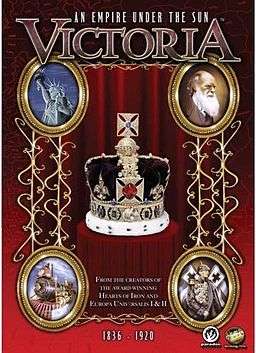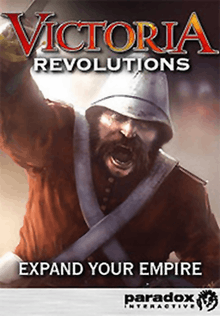Victoria: An Empire Under the Sun
| Victoria: An Empire Under the Sun | |
|---|---|
 | |
| Developer(s) | Paradox Interactive |
| Engine | Europa Engine |
| Platform(s) | Microsoft Windows, Mac OS X |
| Release date(s) | 2003 |
| Genre(s) | Grand strategy |
| Mode(s) | Single player |
Victoria: An Empire Under the Sun is a grand strategy game by Paradox Entertainment (now known as Paradox Interactive), released in 2003. It covers primarily its namesake the Victorian period (1837-1901) and beyond, specifically 1836-1920 for the main game, and extended until 1936 if the expansion is installed. The game runs on a modified version of the Europa Universalis engine, and the lead game programmer was Johan Andersson. It was later ported to Macintosh by Virtual Programming.
Unlike previous Paradox Games, which either focused on diplomacy (Europa Universalis) or war (Hearts of Iron), Victoria focuses on internal management, covering the industrialization and social/political changes in a country. The game itself gives a lot of importance to the economy of a country, having a complex market system which is described as being one of the best economic simulators ever made. Fans of Paradox's games have noted this one for being the deepest game Paradox had yet made, making it quite popular with the Paradox fanbase. However, Victoria received largely indifferent reviews on release, averaging only 60.4% on GameRankings. Critics cited reasons such as the game's steep learning curve and its relatively dated graphics.
On August 19, 2009, Victoria II was announced, and was released on August 13, 2010.[1]
Game mechanics
Victory conditions
The main goal is to end the game with most Victory Points. To get victory points, the player must score in three categories:
- Prestige - claiming colonies, winning wars, implementing social and political reforms, researching technologies or through historical events.
- Industry - building factories, converting farmers and labourers to craftsmen and by improving the country's transportation network.
- Military - the size and quality of the country's army and navy.
The combined score of the above three categories determines the "winner" of the game.
Economy
The economic system in Victoria attempts to simulate the flow of resources in a world market. Every province in the game produces a resource. Some resources, such as wheat, are demanded principally by POPs (population units), and can be sold directly. Other materials, such as timber, are consumed mostly by industry - but can nonetheless be sold directly for less profit. The player possesses a wide range of options with which to build their economy, provided they have access to the proper raw materials. All resources can be collected or produced by industry. They can also be acquired on the world market. Access to the world market is granted based on a country's prestige rating.
Resources
Victoria has 47 separate resources, produced by collection or production (or in one case both). Important resources include:
- Steel, important for the building of industry, railroads and some war goods, and generally profitable to produce;
- Coal, used in the production of a formidable number of resources;
- Sulphur, a bottleneck good in the production of arms and ammunition;
- Precious metal, a very expensive luxury good, with a minor role in changing POP classes;
- Opium, an expensive luxury good and a major motivator for aggressive imperialism in Asia;
- Machine parts, vital for the building of industry and generally the bottleneck in industrialization.
Industrialization
The game focuses on industrialisation in a country, which is driven by technological research. The acquisition of machine parts is crucial to industrialization, as they are needed to build factories.
Diplomacy
Diplomacy is managed bilaterally; nations can engage in diplomacy using a variable yearly supply of diplomats, offering various treaties and entreaties to other states. Players can use money to improve relations with the other powers; offer to negotiate for technology, territory, colonial claims, and money; sign pacts of unilateral or mutual defense or full alliances; demand the cessation of colonialization of certain areas; and, if all other efforts fail, declare war.
Warfare
Warfare in Victoria is a special circumstance of diplomacy wherein two players attempt to invade one another's (national or colonial, depending on the war) territory. It is abstract, and consists of divisions marching to hostile territory and fighting a hands-off battle that the player has no control over save by sending reinforcements or withdrawing. Combat efficiency, however, can be influenced decisively by the player. Appointing generals or admirals influences the morale and organization of the troops, as do technological improvements. An advanced railroad system in a province grants the province's owner bonuses in combat, as well as increased mobility. Provinces can also be fortified and troops will entrench when left alone long enough, both giving enormous combat benefits.
The ultimate objectives in warfare is dramatically different from those of other strategy games: it is generally very difficult to do severe damage to an enemy's economy in a single war, occupied territory is only temporarily in the hands of the occupier, and post-war territorial gains are generally modest and difficult to subdue. However, there are other conditions to peace such as War Indemnities and Humiliation.
Declaring war or seizing provinces from civilized countries without pre-existing claims makes diplomacy more difficult and can eventually lead to preemptive war from other powers. Warmongers tend to discover themselves radically isolated from the rest of the world and forced to engage in warfare almost continuously, which can lead to neglect of industry and prestige.
Units
Military units in Victoria are divided into two types: land and naval. Land units fight against enemy land units, and can occupy enemy provinces. They are the key to military supremacy. Naval units provide a more supportive role; bombarding enemy land units and fighting sea battles. Some naval units can also transport land units.
Land units in Victoria are divided into four types:
- Infantry - the backbone of any army. Foot division of 10,000. Strong "fire attack", weak "shock attack", slow.
- Cavalry - a supplementary unit. Mounted division of 10,000. Weak "fire attack", strong "shock attack", fast.
- Dragoons - an intermediate unit. Semi-mounted division of 10,000. Intermediate in all respects.
- Irregulars - a weak unit, only found in uncivilized nations. Foot division of 10,000. Weak in all respects.
Mods
Like most popular Paradox games, multiple mods have been made for Victoria. The most popular of these mods is the Victoria Improvements Project commonly referred to as VIP. VIP includes new AI personalities, changed economy rules, new events and new nations. Other players who have become bored with the default situation of the world in the beginning of the game create alternative history mods, with other great powers. The Mod Franchil is one of the most popular for French-speaking people.
Reception
| Reception | ||||||||||||
|---|---|---|---|---|---|---|---|---|---|---|---|---|
| ||||||||||||
Victoria got mostly mixed reviews from critics. GameSpot commented on its "wonderful depth" and "great alternate-history ambiance." However, GameSpot commented that the game was "more work than play," citing its steep learning curve and overall scope of options. IGN commented that the game had unique potential, but was crushed by its "bugginess" and lack of tutorial.[4] Barry Brenesal ended his IGN review, explaining, "There's an excellent game struggling to surface in Victoria, and I look forward to playing it just as soon as the requisite patches appear. Now would some kindly soul please create an accurate, intelligent manual for the game?"
Victoria: Revolutions

Victoria: Revolutions is the expansion pack for Victoria: An Empire Under the Sun. It was released on August 17, 2006 through GamersGate, and on CD in October 2006.
New features
- 15 extra years of game play, extending Victoria into the interbellum.
- An expanded tech tree to cover the interwar period, including aircraft and carriers.
- A Doomsday converter which allows players to continue their game in Hearts of Iron II: Doomsday.
- A revamped election and politics system, adding a new level of realism to the game.
- A new ideology, fascism
- An overhauled military system, which will be linked with the player’s policy decisions.
- A new economic system that brings more realism through various economic models.
See also
References
- ↑ Victoria 2 Announcement, Paradox Plaza
- ↑ "Victoria: An Empire Under the Sun (PC) on Metacritic". Metacritic. Retrieved 2012-10-07.
- ↑ Todd, Brett, (December 4, 2003). "Victoria: An Empire Under the Sun Review". GameSpot. Retrieved 7 October 2012.
- ↑ http://www.ign.com/articles/2003/12/09/victoria-review?page=4